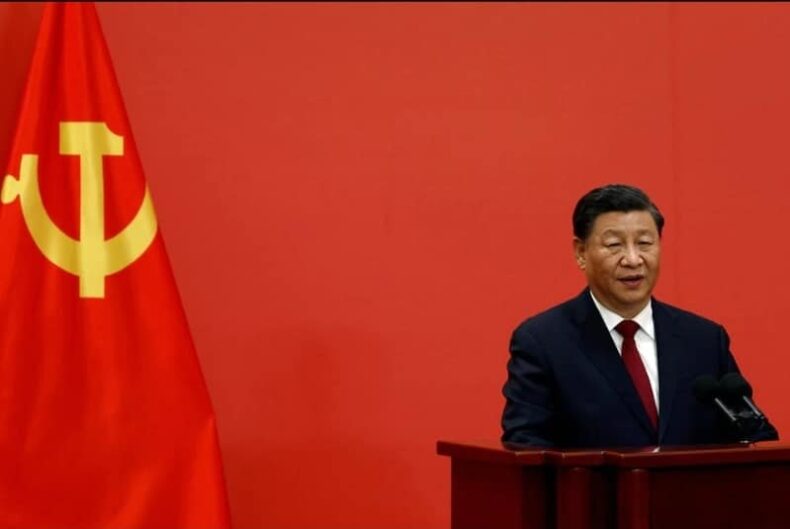On October 23, 2022, at the Great Hall of the People in Beijing, China, Chinese President Xi Jinping addresses the media as the newly elected members of the Politburo Standing Committee meet with the media.

With greater authority than ever, China’s Xi Jinping begins his third term as president with a mountain of issues to solve, including a failing economy, his own COVID-19 strategy which has forced the nation into a corner, and deteriorating relations with the West.
After the leadership of his ruling Communist Party was changed during its twice-decade congress, which ended last week. Xi, 69, is now need to replace a variety of positions in the party and state bureaucracy at home.
After Xi presented on Sunday a new Politburo Standing Committee filled with loyalists, the economy, to be overseen by a lame-duck premier until a parliament session in March, is plagued with zero-COVID, a property crisis, and declining market confidence.
The annual Central Economic Work Conference of the party, which generally takes place in December and determines the economic agenda for the parliament session, will provide investors with hints about how China would approach economic policy in the months leading up to and during the conference.
The yuan fell to its worst level in nearly 15 years on Monday, as investors fled Chinese assets over concerns that under China’s most powerful leader since Mao Zedong, ideology will increasingly trump economic progress.
Particularly, Xi’s reiteration of the policy dashed the hopes of investors and numerous irate Chinese that the end of the congress would see authorities start to roll back the strict zero-COVID rules.
Scott Kennedy, a China specialist at the Center for Strategic and International Studies in Washington, said, “My assumption is that we will now see the “full Xi” approach to everything.”
Since he is obviously combining growth with equity, security, and climate goals, he said, “that very well could entail ongoing confusing economic policies, and greater tensions with the West along a lot of fronts.”
But it also creates the possibility that, when China encounters more difficulties, Xi will be able to make a significant change in course without worrying about coming under attack from other factions.
‘WINNING FORMULA’
Many observers of China anticipate more of the tough diplomacy which has alienated Beijing from the West, on topics ranging from human rights and pressure on Taiwan to support for Vladimir Putin of Russia as Xi focuses more and more on security and self-sufficiency.
Despite being perceived as harsh in the West, that forceful approach is well-liked back home.
“I cannot imagine China conducting diplomacy in any other way. It believes it has a winning formula, so why alter it?” according to a Western ambassador in Beijing.
The diplomat claimed on Tuesday that China’s approach is to influence “swing” nations in order to get support at the UN.
We formerly believed that our friendship with China was important, but today we understand that it has given up on establishing ties with the West.
Washington acknowledged listening to the legislature and emphasised the value of maintaining open channels of communication.While it is likely that Xi and U.S.
President Joe Biden will attend a G-20 gathering in Bali, Indonesia, next month, it is unclear if their face-to-face encounter will mark their first as heads of state.
Beijing has not officially confirmed that Xi will go.
A broad U.S. embargo on semiconductor technology exports to China, meanwhile, feeds Beijing’s suspicion that Washington is trying to restrain it.
Party observers anticipate Chen Wenqing, his minister of state security, to be promoted to China’s top security position in light of Xi’s warnings about an increasingly dangerous world.
This would be the first such promotion, which analysts say suggests a greater emphasis on intelligence.
According to Dali Yang, a political science professor at the University of Chicago, there won’t be any easing of, say, the competitive dynamics with the United States.
Yang also cautioned against “group-think” among a group of supporters.
XI’S MEN IN

In the largest reorganisation in five years, Xi is planning to replace leaders in crucial bureaucratic positions after packing the top party levels with his acolytes.
According to sources who spoke to Reuters, central bank governor Yi Gang is expected to step down in 2019.
Yin Yong, who served as deputy governor from 2016 to 2018, is expected to take over as governor.
He is a former subordinate from Xi’s time as the party chairman of the eastern province of Zhejiang, like many up-and-comers.
Former economic czar Liu He, 70, and former head of the central bank party Guo Shuqing, 66, were also not included in the party’s new central committee as pro-reform policymakers.
Premier Li Keqiang will be replaced by Li Qiang, Xi’s new No. 2.Ding Xuexiang, who served as Xi’s chief of staff and was appointed to the new Standing Committee, is also one of the newcomers.
Party observers anticipate that he will be confirmed as the ranking vice premier, in March.
Ding lacks substantial economic experience, in contrast to many recent occupants of that office.












